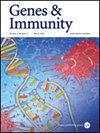A scan of pleiotropic immune mediated disease genes identifies novel determinants of baseline FVIII inhibitor status in hemophilia A
IF 4.5
3区 医学
Q1 GENETICS & HEREDITY
引用次数: 0
Abstract
Hemophilia-A (HA) is the X-linked bleeding disorder caused by heterogeneous factor (F)VIII gene (F8)-mutations and deficiencies in plasma-FVIII-activity that prevent intrinsic-pathway mediated coagulation-amplification. Severe-HA patients (HAPs) require life-long infusions of therapeutic-FVIII-proteins (tFVIIIs) but ~30% develop neutralizing-tFVIII-antibodies called “FVIII-inhibitors (FEIs)”. We investigated the genetics underlying the variable risk of FEI-development in 450 North American HAPs (206 and 244 respectively self-reporting black-African- or white-European-ancestry) by analyzing the genotypes of single-nucleotide-variations (SNVs) in candidate immune-mediated-disease (IMD)-genes using a binary linear-mixed model of genetic association with baseline-FEI-status, the dependent variable, while simultaneously accounting for their genetic relationships and heterogeneous-F8-mutations to prevent the statistical problem of non-independence. We a priori selected gene-centric-association-scans of pleiotropic-IMD-genes implicated in the development of either ≥2 autoimmune-/autoinflammatory-disorders (AADs) or FEIs and ≥1 AAD. We found that baseline-FEI-status was significantly associated with NOS2A (rs117382854; p = 3.2 × 10−6) and B3GNT2 (rs10176009; p = 5.1 × 10−6)—pleiotropic-IMD-genes known previously to function in anti-microbial-/-tumoral-immunity but not in the development of FEIs—and confirmed associations with CTLA4 (rs231780; p = 2.2 × 10−5). We also found that baseline-FEI-status has a substantial heritability (~55%) that involves (i) a F8-mutation-specific component of ~8%, (ii) an additive-genetic contribution from SNVs in IMD-genes of ~47%, and (iii) race, which is a significant determinant independent of F8-mutation-types and non-F8-genetics.

多效性免疫介导疾病基因扫描确定血友病A中FVIII抑制剂基线状态的新决定因素。
血友病a- a (HA)是由异质因子(F)VIII基因(F8)突变和血浆fviii活性不足引起的x连锁出血疾病,可阻止内在途径介导的凝血放大。严重ha患者(HAPs)需要终生输注治疗性tfviii蛋白(tfviii),但约30%的患者会产生称为“fviii抑制剂(FEIs)”的中和性tfviii抗体。我们通过使用与基线fei状态(因变量)遗传关联的二元线性混合模型,分析候选免疫介导疾病(IMD)基因的单核苷酸变异(snv)基因型,研究了450名北美HAPs(分别为206名和244名自我报告的黑人-非洲或白人-欧洲血统)发生fei的可变风险的遗传学。同时考虑它们的遗传关系和异质f8突变,以防止非独立性的统计问题。我们先验地选择了与≥2种自身免疫/自身炎症疾病(AAD)或FEIs和≥1种AAD相关的多益性imd基因的基因中心关联扫描。我们发现基线fei状态与NOS2A显著相关(rs117382854;p = 3.2 × 10-6)和B3GNT2 (rs10176009;p = 5.1 × 10-6)-多效性- imd基因先前已知在抗微生物/肿瘤免疫中起作用,但在feis的发展中不起作用,并证实与CTLA4 (rs231780;p = 2.2 × 10-5)。我们还发现,基线fei状态具有相当大的遗传力(~55%),其中包括(i) f8突变特异性成分(~ 8%),(ii) imd基因中snv的加性遗传贡献(~ 47%),以及(iii)种族,这是一个独立于f8突变类型和非f8遗传的重要决定因素。
本文章由计算机程序翻译,如有差异,请以英文原文为准。
求助全文
约1分钟内获得全文
求助全文
来源期刊

Genes and immunity
医学-免疫学
CiteScore
8.90
自引率
4.00%
发文量
28
审稿时长
6-12 weeks
期刊介绍:
Genes & Immunity emphasizes studies investigating how genetic, genomic and functional variations affect immune cells and the immune system, and associated processes in the regulation of health and disease. It further highlights articles on the transcriptional and posttranslational control of gene products involved in signaling pathways regulating immune cells, and protective and destructive immune responses.
 求助内容:
求助内容: 应助结果提醒方式:
应助结果提醒方式:


